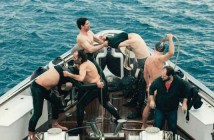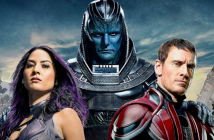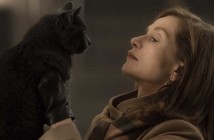Cast: Diane Kruger, Djimon Hounsou, Benoît Magimel
Director: Stéphane Rybojad
Country: France
Genre: Action | Drama | War
Official Trailer: Here
Editor’s Note: Special Forces is on limited release from today
It’s hard not to wonder just how John Rambo went from the sensitive, misunderstood Vietnam veteran of First Blood to the trigger-happy one-man army of 2008’s Rambo, the differences between the two rendering them characters divided by much more than merely a sizeable time gap. The blandly titled Special Forces offers something of an insight into such a bizarre character evolution; functioning essentially as a badly rewritten collage of the very worst aspects of the Rambo series—meaning, of course, that First Blood does not feature at all in this calamitous cocktail—it plays like a rollercoaster ride from high-risk rescue mission to full-blown wartime action to survivalist thriller, its characters seeming to freely leap from genre to genre and tone to tone as each old one runs out of steam.
Hopping reliably along the chronology of John Rambo’s adventures, Special Forces embodies the worst traits of this action-war hybrid, its greatest offense the rooting of such ridiculously theatrical gunplay in a conflict marked by abundant real-world controversy. Positing itself a serious, if light-hearted, war story, its boisterous sense of violent entitlement and gung-ho one-sidedness give it a troubling sense of giddy abandon about its blood-stained business.
 Dispatched by French authorities to rescue a popular, controversial journalist captured while reporting from Afghanistan, the special forces of the title infiltrate the base camp and rush their charge to the helicopter rendezvous. The planned extraction failed, they flee toward the border pursued by a miniature army of disposable Afghanis, before forced in a gruesome showdown to battle it out, biggest guns win. Hopping reliably along the chronology of John Rambo’s adventures, Special Forces embodies the worst traits of this action-war hybrid, its greatest offense the rooting of such ridiculously theatrical gunplay in a conflict marked by abundant real-world controversy. Positing itself a serious, if light-hearted, war story, its boisterous sense of violent entitlement and gung-ho one-sidedness give it a troubling sense of giddy abandon about its blood-stained business. It’s astonishing to see so many foes brutally dispatched—many of them ostensibly unarmed—without any trace of moral quandary; especially considering that the film exploits our knowledge of the reality of this situation and such daily deaths as these, there’s a considerable unease in watching these characters shoot their way through enemies by the dozen, never once stopping to wonder exactly what it is that makes them the good guys.
Dispatched by French authorities to rescue a popular, controversial journalist captured while reporting from Afghanistan, the special forces of the title infiltrate the base camp and rush their charge to the helicopter rendezvous. The planned extraction failed, they flee toward the border pursued by a miniature army of disposable Afghanis, before forced in a gruesome showdown to battle it out, biggest guns win. Hopping reliably along the chronology of John Rambo’s adventures, Special Forces embodies the worst traits of this action-war hybrid, its greatest offense the rooting of such ridiculously theatrical gunplay in a conflict marked by abundant real-world controversy. Positing itself a serious, if light-hearted, war story, its boisterous sense of violent entitlement and gung-ho one-sidedness give it a troubling sense of giddy abandon about its blood-stained business. It’s astonishing to see so many foes brutally dispatched—many of them ostensibly unarmed—without any trace of moral quandary; especially considering that the film exploits our knowledge of the reality of this situation and such daily deaths as these, there’s a considerable unease in watching these characters shoot their way through enemies by the dozen, never once stopping to wonder exactly what it is that makes them the good guys.
Frustratingly incompetent and thematically underwrought as it is, the film’s narrative might at least be partially tolerable were it not unbearable to watch unfold: in both its cinematography and editing, this is a movie striving vainly for visual flair, finding instead only vomitous flashiness that tars its every scene with the rapidity of its cuts and vacuity of its camerawork. Simple dialogue scenes between two people sat opposite each other are treated as action sequence, almost every word given its own shot as the camera hops from one conversant to the next and back… and back and back and back and back and back. It’s an irony, this dizzying dialogue shooting considered, that the actual action scenes are so slow-moving and devoid of sheen; combatants fire steady streams of bullets before the camera moves to observe the returned fire, the battles shot more in the style of turn-based table-top strategy games than that of warfare.
…in both its cinematography and editing, this is a movie striving vainly for visual flair, finding instead only vomitous flashiness that tars its every scene with the rapidity of its cuts and vacuity of its camerawork. Simple dialogue scenes between two people sat opposite each other are treated as action sequence, almost every word given its own shot as the camera hops from one conversant to the next and back… and back and back and back and back and back.
 Its total lack of pacing regulation, somehow, is not the worst offense of the film’s dreadful editing: that dubious honour instead belongs to the baffling, bothersome penchant for fades to black at just about every interval imaginable. Not only disrupting any semblance of flow the film’s narrative might yet retain, the strange constancy of the fades provokes with disquieting regularity the faint hope that the film might be ending; alas, it’s never quite the case, and each new black screen marks only the beginning of yet more sorely ill-shot sequences of inconsequential characters trekking across desolate landscapes toward some wholly unremarkable goal. Their personal aspirations are hammily evinced in some of the most painfully tiresome expository dialogue, clumsy clichés dropped wherever character depth is needed during whatever erratic scenes of conversation the baggy narrative permits.
Its total lack of pacing regulation, somehow, is not the worst offense of the film’s dreadful editing: that dubious honour instead belongs to the baffling, bothersome penchant for fades to black at just about every interval imaginable. Not only disrupting any semblance of flow the film’s narrative might yet retain, the strange constancy of the fades provokes with disquieting regularity the faint hope that the film might be ending; alas, it’s never quite the case, and each new black screen marks only the beginning of yet more sorely ill-shot sequences of inconsequential characters trekking across desolate landscapes toward some wholly unremarkable goal. Their personal aspirations are hammily evinced in some of the most painfully tiresome expository dialogue, clumsy clichés dropped wherever character depth is needed during whatever erratic scenes of conversation the baggy narrative permits.
Many though they are, it’s unfair to focus too much on the film’s drawbacks; they may prove by far its most memorable aspects, but it would be wrong not to complement the mutual prowess of the cast members in their roles. Diane Kruger embodies the damsel in distress with appreciable aplomb: she may be walking in stereotyped shoes, yet she manages nevertheless to bring something to the role. Fellow Inglorious Basterds alumnus Denis Menochet is a highlight of the titular crew alongside Djimon Hounsou, both giving their all in roles restricted by the mediocrity of the writing and its cloying efforts at sentimental sympathy among bouts of glorified, gory violence. Tonally erratic to the point of wailing hysteria, Special Forces never manages to settle upon a single genre, aesthetic, or even narrative to follow, ludicrously leaping about the place without even the technical skill to excuse its storytelling silliness. As bad a film as Rambo III—the worst of Stallone’s series—may have been, at least it knew its place, at least it was comic enough in the campiness of its style to avoid any such issues of chest-beating warmongering. Desperately seeking sympathy for its characters with an almost amusingly overbearing soundtrack and painting its adversaries in disconcertingly villainous tones for what is, at least by intention, a realistic war drama, Special Forces manages to be a film a great deal more contemptible.
[notification type=”star”]22/100 ~ PAINFUL. Tonally erratic to the point of wailing hysteria, Special Forces never manages to settle upon a single genre, aesthetic, or even narrative to follow, ludicrously leaping about the place without even the technical skill to excuse its storytelling silliness.[/notification]



